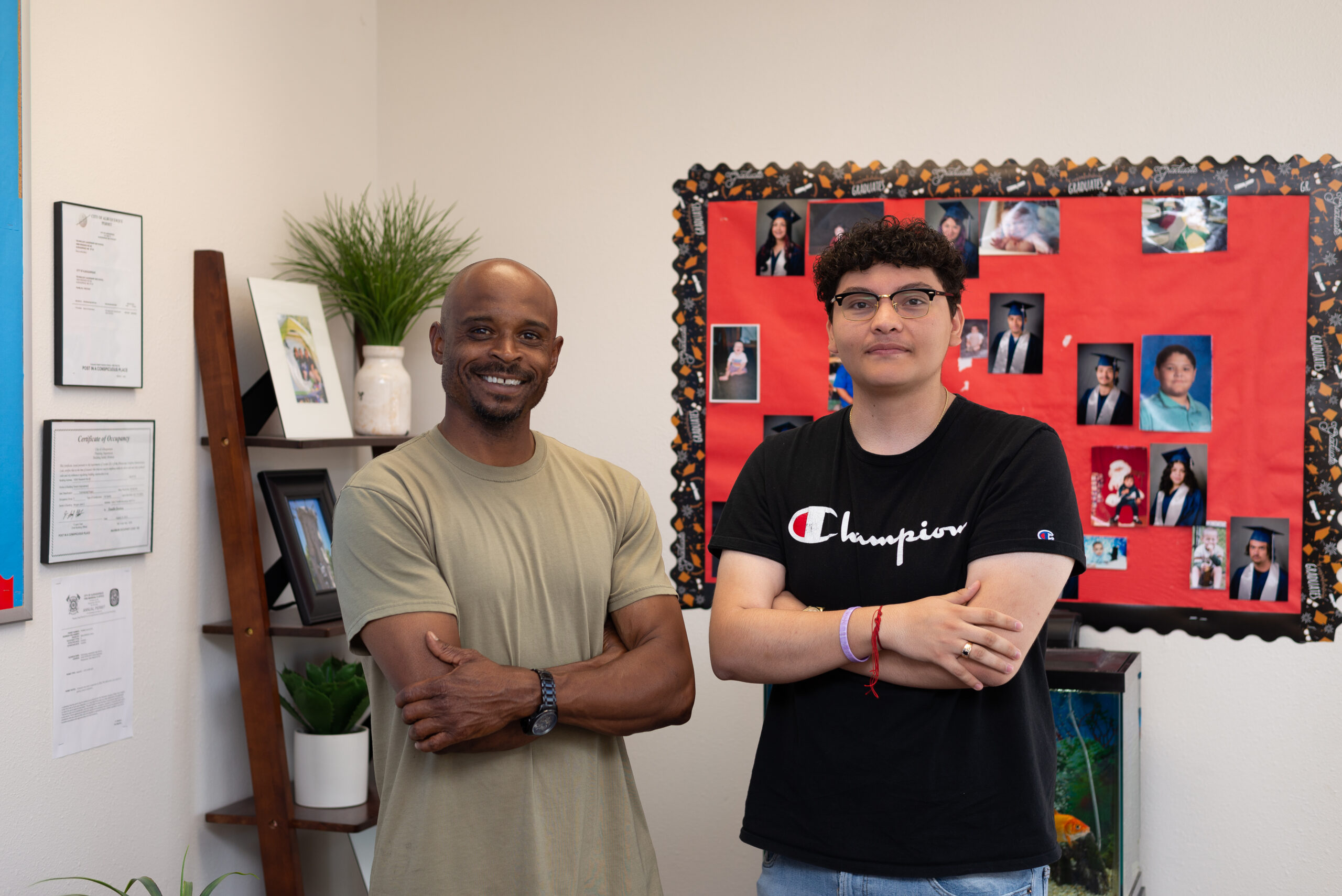Mentorship in Mental Health: Finding Meaning and Resilience

"Internships like this help students move from post-traumatic stress to post-traumatic wisdom."
Brian Marquez and Charles Dorsey are one of many intern-mentor pairs in the X3 Youth Mental Health program—but their story started earlier.
Charles is a School Social Worker at Technology Leadership High School and a mentor to Youth Mental Health First Aid (YMHFA) Intern, Brian. Mentorship is at the heart of Future Focused Education’s X3 Youth Mental Health Initiative First Aid Internship program.
Charles was originally Brian’s basketball coach. He approached Brian about participating in the internship during Brian’s senior year of high school because he knew that Brian wanted to get better at his emotional skills.
“My coach came up to me and gave me a speech, told me the benefits and how this could change my life,” says Brian. “And I do love helping people, I’m very social. So I applied.”
“It was a great opportunity for him to embrace his empathetic, compassionate side because he had talked about how that had been a difficult space,” says Charles.
Brian enjoyed being a YMHFA intern so much last year that he signed up for a second year too. “There are just amazing people,” he says. “I’ve grown as a person, become more considerate, put myself in other people’s shoes.”
Charles has been in his position at Technology Leadership High School (Tech) for four years. “I’m originally from Albuquerque, so it’s important to me that I’m giving back to the community,” says Charles about his role as a mentor in the YMHFA program.
“Through the program, we are able to empower young people and teach them how to be supportive and be an advocate. It helps them build skills around compassion and empathy—which is great for them and the community as a whole.”
Mentorship and Mental Health
Mentorship is a key component of any successful X3 internship, but for YMHFA interns, it means even more, because interns are helping students with problems that could be really intense or traumatic for them.
“It is really important for [YMHFA] interns to have a safe space and supportive relationships to go to if they are feeling emotionally activated from their work with students, to reframe and process what they are learning from these experiences,” says Ali Moore, Director of Social Emotional Learning and Well-being at Future Focused.
Ali says a mentorship model is common in behavioral health clinics, because vicarious trauma can happen. Still, internships like this can help people tap into and build their personal agency. It can be empowering and can help move people from post-traumatic stress to post-traumatic wisdom.
“When people are given opportunities to find meaning and are surrounded by communities of support, they bloom their resilience,” says Ali.
Charles says he’s watched Brian grow emotionally as he provides support to students at Tech. In turn, Charles provides support to Brian. And, though the pair have known each other for years now, the YMHFA program has deepened that connection as Charles has seen Brian learn and grow and challenge himself.
The Bigger Picture
“Our previous relationship has evolved as I observed [Brian] from a new standpoint,” says Charles, who also says that the experience has also given him an opportunity to reflect on his ability to supervise others.
“Plus, interns have young, fresh eyes, and can give us ways of relating and navigating situations we might not think of,” adds Charles. “They can help translate between what the students are saying, what all their lingo means, which social media we should use, things like that.”
Brian led the charge creating a website with mental health resources for students at Tech—something that no one had previously had the capacity to do. He says he made it for students who don’t feel comfortable enough talking about their mental health struggles to approach him or others, so they could find resources.
“But,” says Brian, “students are a lot more comfortable than they were. And we’ve gotten five or six teachers certified in Youth Mental Health First Aid too. They know what to look out for now.”
Through the internship at Tech, Brian has also become a certified Youth Peer Support Specialist and a certified instructor of Teen Mental Health First Aid. Both of these programs are available to interns, teachers, and anyone interested in better supporting youth with mental health.
Having interns like Brian has also helped support the staff at Tech.
“It’s given them a sense of relief because he is a liaison between the students and adults,” says Charles. “And it’s reassuring for the staff to have that. And among the student population, it’s one of those things where we’ve just been able to normalize talking about mental health more.”
Charles and Brian are part of a much larger ecosystem of mentoring and mental health support at Technology Leadership High school, but their relationship is an example of what makes internship programs work.
Brian has recruited other interns and also championed the program in a recent op-ed for the Albuquerque Journal. You can read more about the ins and outs of Brian’s YMHFA internship here.
Want to start an internship like this at your school? Get in touch with Future Focused’s Ali Moore for more information.


